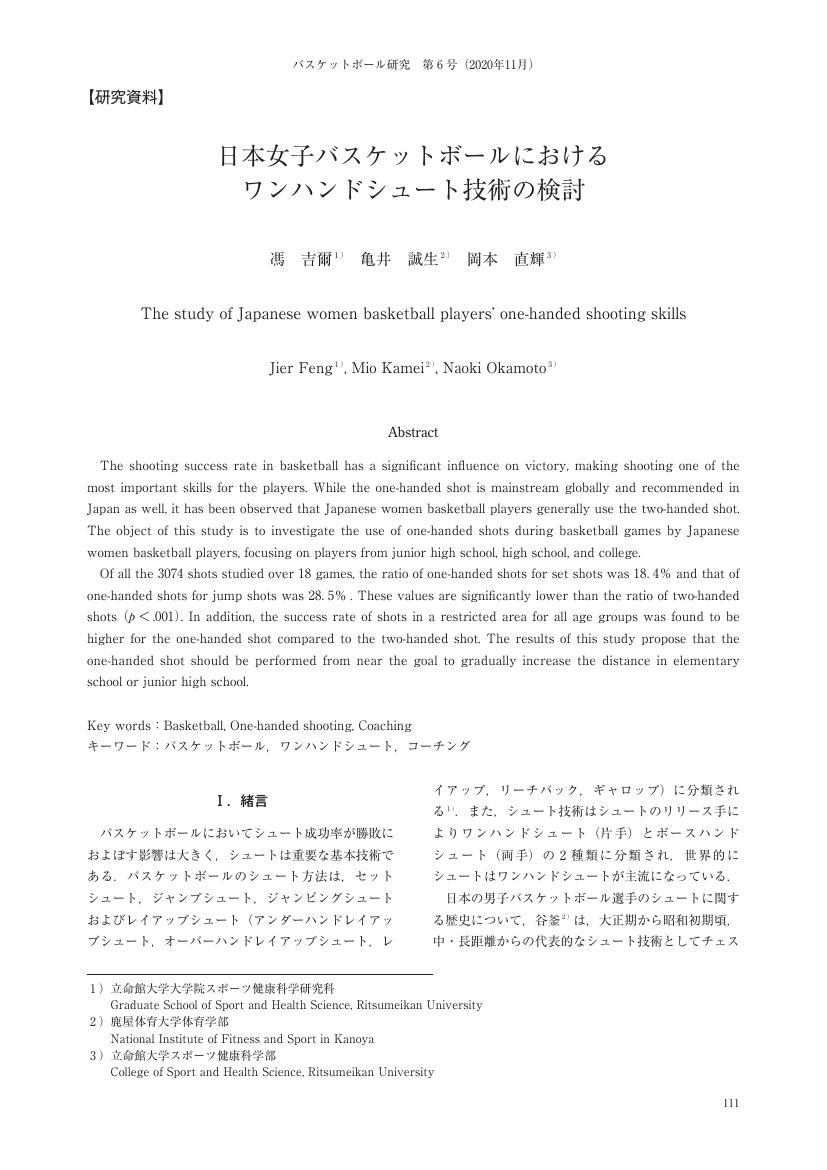2 0 0 0 OA 日本女子バスケットボールにおけるワンハンドシュート技術の検討
- 著者
- 馮 吉爾 亀井 誠生 岡本 直輝
- 出版者
- 日本バスケットボール学会
- 雑誌
- バスケットボール研究 (ISSN:21896461)
- 巻号頁・発行日
- vol.6, pp.111-118, 2020 (Released:2021-12-08)
1 0 0 0 OA スポーツ指導場面における暴力に関わる指導者のパーソナリティ
- 著者
- 亀井 誠生 岡本 直輝
- 出版者
- 一般社団法人 日本体育・スポーツ・健康学会
- 雑誌
- 体育学研究 (ISSN:04846710)
- 巻号頁・発行日
- vol.67, pp.929-945, 2022 (Released:2022-11-11)
- 参考文献数
- 58
Since 2013, corporal punishment by coaches in athletic clubs has been decreasing. However, there have been instances of coaches perpetrating violence while coaching students, despite the existence of penalties for corporal punishment. Such instances may be due to individual personality, whereby feelings of dissatisfaction are easily translated into violence. In this study, we attempted to clarify the relationship between severe forms of coaching (corporal punishment, rants) and coaches' personalities. We obtained questionnaire responses from 425 college students regarding their experiences with corporal punishment and rants by their coaches and the Big Five personality traits of the coaches. Among the respondents, 21.9% (93 students) had experienced corporal punishment and 53.6% (227 students) had endured rants. Hierarchical cluster analysis was conducted to identify four coach personality clusters (Resilients, Overcontrollers, Undercontrollers, Non-identifiables). A comparison among the clusters revealed that overcontrolling coaches (high neuroticism, low agreeableness) exhibited a significantly higher frequency of corporal punishment and rants. These results indicate that a fundamental understanding of the individual characteristics behind the violent behavior (social behavior) of coaches is essential for eradication of violence such as corporal punishment and rants.
1 0 0 0 OA 高等学校運動部活動中の指導場面における暴言について
- 著者
- 亀井 誠生 岡本 直輝
- 出版者
- 一般社団法人 日本運動・スポーツ科学学会
- 雑誌
- 運動とスポーツの科学 (ISSN:13421026)
- 巻号頁・発行日
- vol.27, no.1, pp.23-35, 2021-10-31 (Released:2021-11-20)
- 参考文献数
- 47
In recent years, corporal punishment by coaches during athletic activities has been decreasing. On the contrary, verbal abuse, including rants by coaches have been reported frequently by the media. Some severe cases of verbal abuse have driven students to suicide. This severe form of coaching may be the background for coaches’ belief that “corporal punishment and verbal emotionally abusive behaviors are different” following the doctrine that “victory is everything.” The objectives of this study were 1) to clarify the relationship between corporal punishment and verbal abuse in terms of frequency and degree and 2) to identify crucial types of harassment, intimidation, and humiliation-related to severe cases of corporal punishment. A questionnaire on athletic coaching (specifically, corporal punishment and verbal abuse) in high school was answered by 361 college students. Among the respondents, 22.2% experienced corporal punishment and 45.7% endured verbal abuse. Moreover, more experiences involving verbal abuse by coaches were indicative of more experiences of corporal punishment (rs=0.53). Furthermore, more experiences of worrying about verbal abuse led to more experiences of worrying about corporal punishment (rs=0.35). Additionally, there was a significant correlation between experiencing severe corporal punishment and experiencing hearing phrases such as “that’s why everyone thinks you’re an idiot!,” “you’re out of this sport!,” “you’re not qualified to teach the younger members!,” “out of my sight!,” and “you don’t have any potential!” (V>0.35). This study revealed the relationship (frequency and degree) between verbal abuse and corporal punishment in sports coaching situations. Findings indicated that certain words were uttered as verbal abuse in combination with corporal punishment. Further studies may help with the development of methods that deter corporal punishment and verbal abuse by focusing attention not only on clarifying the direct cause of the former but also the daily relationship between coaches and students.
